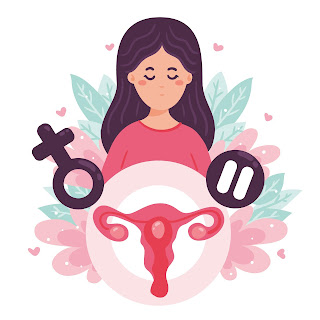LIVING WITH PCOD
Let's get aware of PCOD first before we get deeper into the changes
that come along with this condition. PCOD (Polycystic ovarian disease) is
mostly caused by a combination of hormonal imbalances and genetic tendencies.
In a standard menstrual cycle, the two ovaries will alternately release mature,
ready-to-fertilize eggs each month. Or we can also put it as PCOD is a
condition where the ovaries get enlarged, and produce eggs that are inadequate
or undeveloped and so it turns into cysts. The actual cause of polycystic ovary
syndrome is not well known; however, it entails a mixture of genetics and daily
routine. Diets that include excess spices, oily, junk food, obesity, and
stressful and hormonal disturbances lead us to PCOD.
Many people are living with PCOD unwantedly, still, the exact causes
of PCOD are to date unknown. But it is assumed based on some studies and
observations that PCOD can be caused by excess insulin, unhealthy lifestyle,
low-grade inflammation, high quantity production of male hormones, and
genetics. Other factors which may cause PCOD are pollution and the start of
periods at an early age.
SYMPTOMS
Here we are listing some of the common symptoms of PCOD
- Irregular periods (2-3 months’ delay or so).
- Headaches
- Weight gain especially around the belly area
- Infertility
- Skin darkening especially around the neck region and pigmentation
- Heavy bleeding
- Facial hair growth
- Hair thinning or baldness
RISKS
The risk factors of PCOD are several which people are usually not
aware of. Some of these risk factors of PCOD, which if ignored, can be harmful
are:
- Weight gain
- High risk of breast cancer
- High risk of endometrial cancer.
TREATMENT OF PCOD
The doctors don’t have any exact solution to the problems of PCOD, but
there are certain other treatments for PCOD such as:
- Many cases require advanced treatments like laparoscopic surgery
- Home remedies
- Lifestyle changes
- Injections and other oral medicines are suggested for ovulation and
rupturing of the egg for solving the infertility issue.
- The best way of managing PCOD is weight management, consult a
dietician and try reducing 5-10% of your total weight which will help in
controlling PCOD; Also exercise and try yoregularlysis along with having a
healthy meal plan.
- Consult gynecologists online for delays in periods or heavy bleeding
issues.
- For infertility, doctors suggest fertility drugs.
A number of women trust the gynecologists at Sohana Hospital when they
first notice the symptoms of PCOD/ PCOS. Our doctors diagnose the conditions
correctly and plan the treatment that is best suited for you.




Comments
Post a Comment